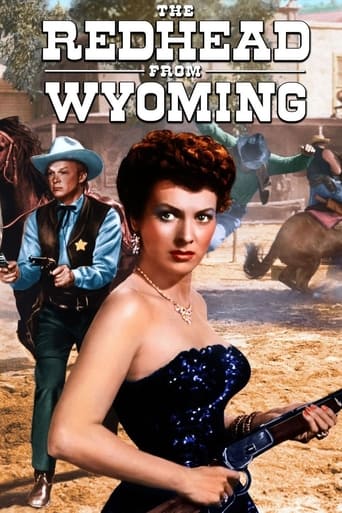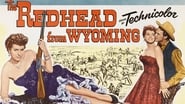bkoganbing
The Redhead From Wyoming casts Maureen O'Hara as a saloon mistress and cattle queen in the new state of Wyoming. Then as now Wyoming is a sparsely populated place and we've got ourselves a typical range war western in this flick.There's a lot stray cattle in Wyoming and a guy can stake a claim, round up some mavericks and start a herd. Only the guy who got there ahead of everybody else is Alexander Scourby owner of the local Ponderosa. He's got an unofficial no trespass sign on unbranded cattle on his range.Into this mix comes O'Hara and William Bishop. O'Hara comes to run the local saloon owned by Bishop. He also sets her up in the cattle business as well. But he's got an agenda all his own and I will say he dreams big.Maureen O'Hara as The Quiet Man was opening to rave reviews was busy working on this film and she called it a 'stinkeroo' in her memoirs. But it's a matter of perspective, next to The Quiet Man it really is. But it's not a bad action western.Possibly also she saw that William Bishop had the best role in the film by far. As I said he dreams real big, he's got the small ranchers on his side and he's not got their interest at heart. Bishop is slick and crafty with a good line of gab.Nominal hero in the piece is Alex Nicol as the outsider sheriff caught in the middle. Nicol never really registers though as a strong hero, the part called for someone like Jimmy Stewart.A couple of television western regulars had supporting roles here. Dennis Weaver plays one of the small ranchers and Jack Kelly plays Bishop's top gun hand. He has a nasty fight with Alex Nicol in the climax.It's not a 'stinkeroo' as Maureen put it, but unless you're a fan of her's don't go out of your way to see it.
zardoz-13
"Tarzan's Magic Fountain" director Lee Sholem's Technicolor western "The Redhead from Wyoming" qualifies as a thoroughly predictable but nevertheless entertaining, horse opera about a range war between trigger-happy cattlemen and homesteaders in the 1880s, with Maureen O'Hara at her fiery best. Indeed, Scholem's oater modified the Johnson County War which was immortalized later in the notorious, big-budget debacle "Heaven's Gate." Mind you, the 1929 and the 1946 versions of "The Virginian" and "The Ox-Bow Incident" (1943) dealt with the Johnson County War, too. "The Redhead from Wyoming" appropriates one real life participant James Averell as its villain here. Furthermore, Averell's conspirator is his girlfriend. Like Averell's real-life wife, both were accused of cattle rustling. The Maverick law, true-life, old West legislation, ignited the conflict. "Mrs. Parkington" scenarist Polly James, with an uncredited assist from Herb Meadow, who penned 1956 "Lone Ranger" movie, wrote the screenplay from her own story. The dialogue ripples with memorable lines. James and Meadow don't squander a melodramatic second sic-king the heroine, the sheriff, the cattle baron, and the villain at each other. Sholem orchestrates the action with unobtrusive aplomb. Lensed by three-time Oscar-winning cinematographer Winton Hoch of "She Wore a Yellow Ribbon," "The Redhead from Wyoming" bears a rough-hewn, frontier look despite being shot on the Universal Studios backlot. This medium budget oater boasts an adequate amount of gunplay during its larcenous, 81-minute running time."The Redhead from Wyoming" unfolds with the following narration that sets the stage for the showdown between both factions. "When the territories of the great west were thrown open, men of all kinds rushed in. Most came to settle peaceably, lured by free land, gold, cattle. A man could begin a herd with a maverick, an unbranded stray on the public range. By putting his brand on it, he owned it. The cattle barons had started their great herds with mavericks. Now, they fought each settler who tried to do the same. They fought to keep the settlers off the public lands, drive them from their homes, destroy their towns. Vast ranges became the battlegrounds of cattle wars. When the Wyoming big ranchers found guns were not enough, they used the Maverick Law, a law through which they appointed themselves commissioners with power to rule on the ownership of every maverick branded. A commissioner's ruling could declare the settle a rustler, outlaw his brand, make his mavericks illegal to sell. Of course, there was no shortage of sharp-witted men who were quick to take advantage of the law." Sholem backs up the narration with action footage before he shifts the scene to the town square of Sweetwater, Wyoming, where city slicker clad Jim Averell (William Bishop of "The Walking Hills") campaigns for the high political office of governor. Watching from horseback on the fringe is big-time cattle baron, Reese Duncan (Brooklyn-born Alexander Scourby of "Affair in Trinidad"), and he doesn't like a word that Averell utters. "The Maverick Law," Averell avers, "was designed to protect us all against cattle rustling. There is nothing in the law that says new settlers can't pick up unbranded cattle and call them their own. When a cattle commission was appointed to watch over brands and cattle that was for our protection, too." Duncan has had enough of Averell's speech and blasts a hole in his city slicker's hat. Sweetwater Sheriff Stan Blaine (Alex Nicol of "Gunfighters of Casa Grande") fires his gun and calms down everybody. This scene opens up when our leading lady, Maureen O'Hara, arrives by stagecoach with a gaggle of other fancy saloon girls. Kate Maxwell (Maureen O'Hara of "The Quiet Man") learns she is a part of Averell's grand scheme to infuriate Reece Duncan. Averell announces his plans to turn ownership of the saloon that he has been renovating over to Kate. Now, everybody can enjoy music, high-kick dancing, and "the straightest card game in Wyoming." Averell promises the homesteaders that they will have the bucks to blow, too. He adds with a dastardly gleam in his eyes, "Kate's a cattle buyer now. She aims to buy up every maverick you can lay a rope on. Kate's got her own brand, and not some outlaw brand. She'll market your mavericks for you and there's nothing that Duncan and his Cattlemen's Association can do about it." Kate is already suspicious. The last time that she saw Averell was "running out of Abilene like a jack rabbit" leaving her to hold the sack. Duncan rides up and warns Kate not to buy any of his cattle. "Anything you take from me has lead coming after it." As everybody disperses and Averell escorts Kate over to her saloon, they meet Blaine. Averell accounts for Blaine to Kate. "He's just a drifter. Doesn't make any trouble, doesn't want any." In the saloon, Averell draws Kate a sketch of her brand: K Bar M. Kate wonders if the world isn't coming to an end. "Not only is Jim Averell giving things away, but he's paying his debts." Indeed, Averell wants to woo Kate back into his arms. He explains if Reese Duncan is eliminated, he will become governor. Brags Averell: "I'm going to make the whole territory of Wyoming my own private range." Meantime, the nefarious Averell incites anarchy. He hires his own desperadoes to rustle Duncan's livestock. Eventually, Kate learns the truth but is powerless. Kate and Blaine meet. He explains he started drifting at age 13 after his entire family died in a deadly range war. Kate takes a shine to him. She tries to warn Duncan about Averell. James and Meadow provide everybody with an interesting back story. This good, old-fashioned western is a treat, especially the big finale in Sweetwater as well as in the saloon with Kate, Averell, and Blaine shooting it out.
rose-294
Ah, the glamour and pure entertainment of Golden age Hollywood! Shapely saloon queen is caught in the middle of the Wyoming cattle war and between two men: suavely villainous gambler and distrusting sheriff hero. Red-haired Maureen O'Hara, the star of the picture among unknowns, and her dresses blaze in gorgeous 1950's Technicolor, and routine western shenanigans between cattle kings and new settlers are enjoyably went through. Script by Polly James and Herb Meadow is just an excuse to show beauty of O'Hara's heroine and her rosy cheeks, the scenery and glorious colours. Bad thing? No, not at all, on the contrary. Dennis Weaver, Sheriff McCloud from my childhood, has a minor role.
rsoonsa
A voice-over opening, with Winston Hoch's outstanding camera-work of calf roping and branding on screen, is a promising beginning and describes the setting for this film in 1870s Wyoming Territory, aboil with open range cattle raising and rustling, stimulated by the Territory's Maverick Law which permitted settlers to brand calves as their own if they were not within the confines of deeded property. When the voice-over ends the scenario begins, and that is a pity as it is woeful, approaching unintentional pastiche of the genre, with a fast-moving series of scenes lacking development, motivation and narrative continuity helpful to a viewer. An obvious vehicle for the beautiful Maureen O'Hara, splendid in Technicolor with her flaming red hair and green eyes, the piece unfortunately places her acting shortcomings to the fore, although she does her own stunt work, as is her wont. Alex Nicol is miscast as a laconic sheriff and Alexander Scourby is a bit too elegant for his role as a principal landowner, but William Bishop makes something interesting of his part as the film's primary villain, although his dialogue is no more penetrating than that of any other cast member. The plot deploys O'Hara as Kate Maxwell, a dance hall diva who is set up as proprietress of a saloon by her former lover, Jim Averill (Bishop) so that he may utilize her place of business as a front for rustling cattle, whereupon Kate is rent by her dual attraction to Averill and to the sheriff, who is taking steps to oppose this criminal enterprise. Director Lee Sholem, a straight ahead sort, is not given to varying of moods within his pictures, and that is the case here, resulting in a cursory and literal reading of the puerile script. Edward Stevenson's costumes for O'Hara are striking and appropriate and master make-up artist Bud Westmore does not have his craftsmanship disturbed by her riding and shooting activity, which is of a piece with the others in the colorfully garbed cast, whose raiment is barely disturbed by violent goings-on; indeed, the players often appear to be about to launch into song and dance, turning this affair into a musical of sorts, which might have been an improvement. The film includes the debut of Jeanne Cooper and an early effort of Dennis Weaver, atypically portraying a hard case, and somehow Robert Strauss is included in this one, completely out of place. Despite crisp editing, REDHEAD seems to take a long while arriving at its predictable ending, and although the cast never seems the worse for wear from its exertions, the viewer certainly will be, during this motivationless attempt to cast light upon a significant segment of Western American history.




